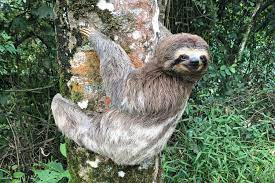The sloth, an emblematic resident of Central and South American rainforests, is a creature that both intrigues and perplexes. With its lethargic pace and cryptic lifestyle, the sloth has fascinated biologists and nature enthusiasts for centuries. Join us on a journey through 52 captivating facets of the sloth, where we unravel its unique adaptations, ecological importance, and the mysteries that shroud this slow-moving marvel.

1. Masters of Slowness: Sloths are known for their extraordinarily slow movements.
2. Arboreal Dwellers: They spend nearly their entire lives in trees.
3. Cryptic Coloring: Their fur often hosts algae, providing natural camouflage.
4. Unique Digestive System: Sloths have a multi-chambered stomach to break down fibrous leaves.
5. Sleepy Lifestyle: They are among the sleepiest animals, snoozing up to 15 hours per day.
6. Mysterious Mating Rituals: Sloth courtship behaviors are still not fully understood.
7. Swimming Skills: Despite their terrestrial life, they are proficient swimmers.
8. Three-Toed vs. Two-Toed: Sloths are categorized into two families based on their toes.
9. Gentle Giants: Sloths are docile creatures, posing no threat to humans.
10. Lifelong Leaf Eaters: Their diet consists primarily of leaves, buds, and flowers.
11. Digestive Efficiency: Specialized bacteria in their stomachs aid in digestion.
12. Elusive Nocturnality: Some species are primarily nocturnal, adding to their mystery.
13. Climbing Champs: Sloths are skilled climbers, using their strong claws.
14. Low Energy Budget: Their slow metabolism conserves energy in the rainforest.
15. Ecological Importance: Sloths play a crucial role in seed dispersal.
16. Microhabitats: Different species inhabit distinct rainforest layers.
17. Lifespan Mysteries: Their longevity in the wild is still a subject of research.
18. Mimicry Marvel: Algae-covered fur offers excellent camouflage in trees.
19. Independent Offspring: Baby sloths are self-sufficient within a year.
20. Migratory Behavior: Some sloth species make seasonal movements for food.
21. Wildlife Tourism Impact: Tourism can disturb their habitats and stress them.
22. Poaching Threat: Illegal trade poses a danger to some sloth species.
23. Slow Metamorphosis: Sloths undergo a gradual, intriguing transformation.
24. Social Solitude: Sloths are mostly solitary, except during mating.
25. Conservation Concerns: Habitat destruction threatens sloth populations.
26. Napping Nirvana: Their extended naps are essential for conserving energy.
27. Hair-Raising Survival: Camouflage keeps them hidden from predators.
28. Viral Sensation: Sloths’ cute appearances make them internet sensations.
29. Enigmatic Behavior: Much about their daily lives remains a mystery.
30. Slow Evolution: Sloths have evolved remarkably slowly.
31. Climate Change Impact: Altered rainfall patterns affect their habitat.
32. Unique Reproduction: The gestation period is among the longest in mammals.
33. Fossil Records: Ancient sloths were enormous compared to today’s species.
34. Threatened Habitats: Rainforest destruction endangers their homes.
35. Conservation Efforts: Organizations work to protect sloth populations.
36. Global Diversity: Sloths inhabit various countries in Central and South America.
37. Folklore and Legends: Sloths feature in indigenous stories and myths.
38. Cultural Significance: Sloths hold a special place in local cultures.
39. Vocal Enigma: Sloths produce unusual vocalizations, yet their purpose is unclear.
40. Keystone Species: Their role in seed dispersal affects rainforest diversity.
41. Scientific Curiosity: Researchers continue to study sloth biology and behavior.
42. Medicinal Wisdom: Some indigenous tribes use sloth parts for traditional medicine.
43. Dynamic Digestion: Sloths host complex ecosystems in their stomachs.
44. Slow Aging: They age at a leisurely pace, reflecting their lifestyle.
45. Future Challenges: Balancing human development with sloth conservation is crucial.
46. Ethereal Beauty: Their languid movements are strangely mesmerizing.
47. Eco-Tourism Potential: Responsible tourism can support conservation.
48. Ancient Ancestors: Sloths’ evolutionary history is a tale of survival.
49. Puzzling Predators: Harpy eagles and jaguars are among their few natural foes.
50. Hidden World: Sloths inhabit a realm of canopies and secrets.
51. Slow and Steady: Their unhurried pace is a testament to nature’s diversity.
52. Rainforest Icons: Sloths embody the wonders of tropical ecosystems.
Explore the enchanting world of the sloth, where slowness is a virtue, and a life of leisure holds secrets to rainforest survival and ecological balance.



















Add Comment